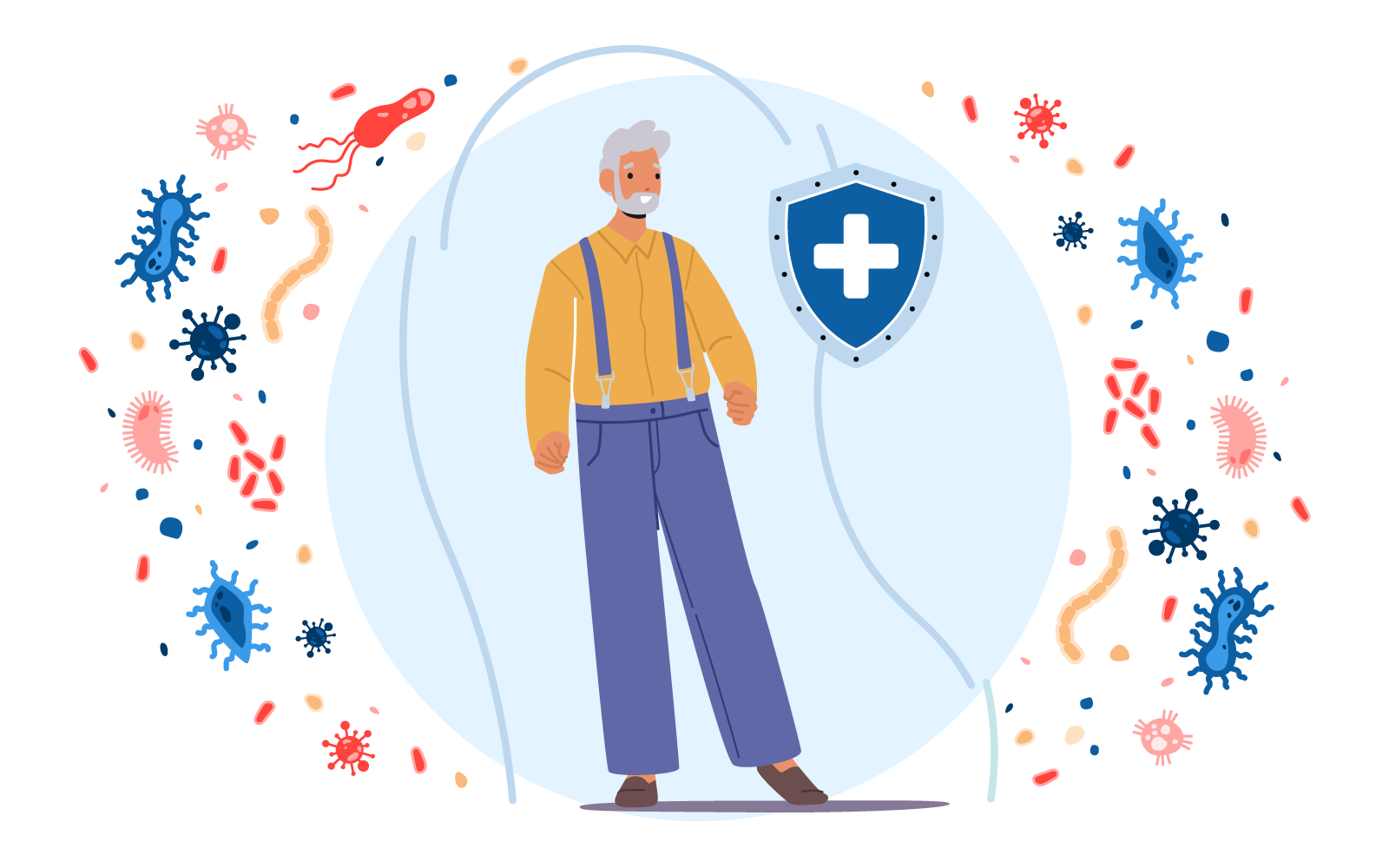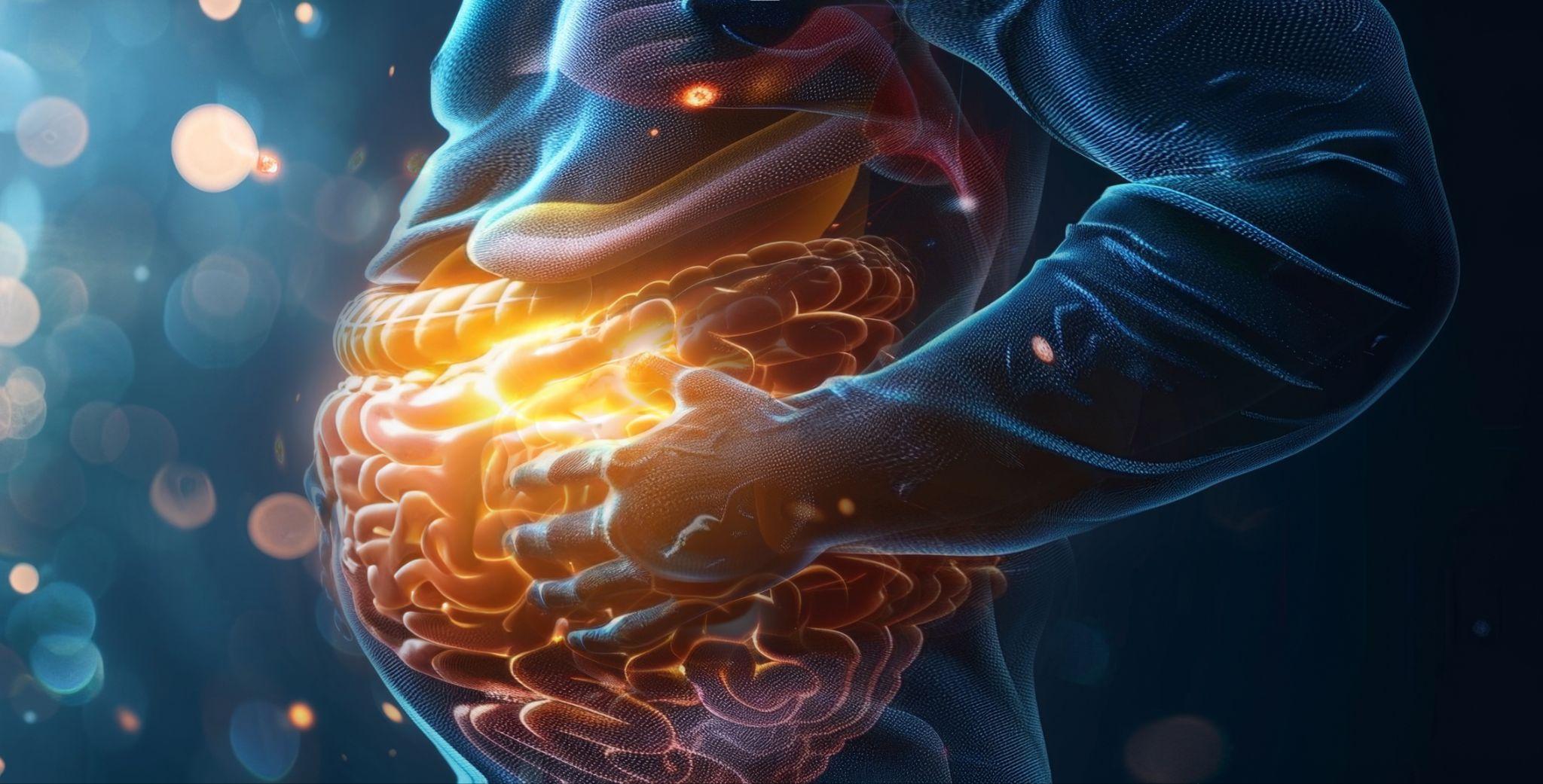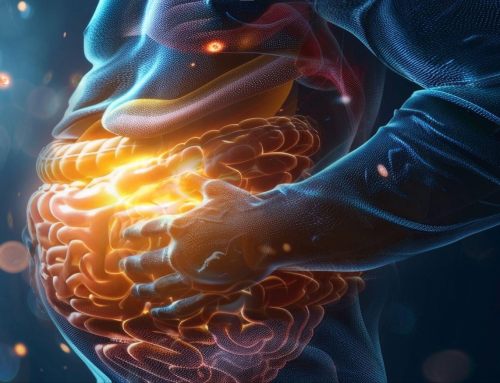Why Is It Important to Understand Immune System Aging?
Why does the health of our immune system matter? What role does it play in aging and disease? A growing body of research suggests it greatly matters, playing a pivotal role in aging, disease, and longevity. Understanding the mechanisms that influence aging and compromise immunity is paramount in negating their effects while optimizing health, vitality, and well-being.
Negative Impacts of Immune System Aging
There are a number of mechanisms and processes in the body that become affected and result in reduced immune system function. Damage to cells, tissues, and body systems occurs as the result of aging, hindering immunity. Our immune system goes through significant age-related changes, which can result in compromised ability to fight off infections, heal wounds, and protect the body against disease.
Layers of Defense: Innate & Adaptive Immunity
The immune system plays a vital role in regularly killing off mutated cells that would otherwise harm us. The immune system comprises innate immunity and adaptive immunity, and both are significant, with various functions in protecting the body.
On a basic level, innate immunity is our body’s initial response to the invader or threat to the immune system (often referred to as the first line of defense), encompassing endothelial lining and mucus membrane. Mucus is essential as it serves protective roles in terms of our immunity. Adaptive immunity is another layer of defense of the immune system and is initiated if the innate immune system cannot initially clear the infection. As a result, adaptive immunity creates a memory, or imprint of the invader, and antibodies to prepare and protect the body. Adaptive immunity functions by recognition of antigen-specific immunity with B & T memory cells. These cells in particular, help the immune system to detect and recall these invaders, allowing for more efficient and targeted responses in the future (1).
Immune Homeostasis & Aging
Both innate and adaptive immunity become compromised due to factors associated with aging. Decreased production in T cells occurs, in addition to a decline in B cell function over time. This is particularly significant, as B cells produce antibodies, which also decline in production due to age.
Compromised mitochondrial health and function affect many of the processes that contribute to aging. Genomic instability, increased oxidative stress, impaired autophagy, and dysregulated nutrient sensing are notable hallmarks of aging. Furthermore, environmental toxins, intestinal permeability, and system imbalances – such as those relating to the microbiome, metabolism, and circadian rhythm – all contribute to reduced immune system function and low-grade inflammation (2).
Immunosenescence & Related Health Conditions
The aging of the immune system has been described as an “accelerator” for other age-related pathologies (1). The immune system becomes weaker and less competent with age. Immunosenescence refers to age-related changes in the immune system, making one more vulnerable or susceptible to infectious diseases, poor wound healing, cancer, autoimmunity, cardiovascular and neurodegenerative disease, osteoporosis, and diabetes. Impaired or compromised cellular health can also wreak havoc on immune function. Metabolic stress serves as a driver and result of cellular aging or senescence through a number of mechanisms.
Inflammaging: The Role of Cytokines
Inflammatory responses occur in the body that wreak havoc on immunity and aging. Inflammaging is a term that describes the aging that occurs when inflammation accumulates in the body. Inflammatory responses occur due to chronic stress, increased oxidative stress, insufficient nutrition, and compromised microbiome health, as well as weakened immunity.
Immune system aging also wreaks havoc on the functioning of body systems. Alterations in metabolism due to various factors stemming from aging and reduced immune health can result in inflammation, which has been suggested to be a driving force in the progression and pathology of many diseases.
Inflammation is a physical and chemical response in the body that significantly compromises immunity. Interleukin 1 and Interleukin 6 are elevated in an inflammatory state affecting the body’s ability to fight off infections and illness. Inflammation has also been indicated to play a role in the aging process via an increase in ROS, along with a decline in immune cell function (3).
Chronic inflammation can result in an inefficient immune system response. Further immune system cells are also affected due to the ongoing process of inflammation, including NK cells, neutrophils, macrophages, and eosinophils, all playing imperative roles in immune function and the modulation of inflammation. Changes in membrane fluidity of the cells are also associated with aging, making them more susceptible to damage (4).
Microbiome Imbalances & Intestinal Permeability
The quality and diversity of the microbiome have significant influence on immunity, as well as the regulation of inflammation and metabolic health. The lining of the gut is also imperative for immune function. Intestinal permeability can occur with age, increased stress, compromised gut functioning, and sensitivities or intolerances to different foods. This is significant, as intestinal permeability can lead to an increase in oxidative stress and inflammation in the system. While adaptive immunity has a number of advantages in terms of quickly identifying foreign invaders, it also has the potential to target its own cells and tissues, which may lead to the development of autoimmune conditions and allergies (5).
Immunity, Stress, & Autoimmunity
Chronic stress has been shown to impair immune function through activation of the HPA axis, increasing cortisol while decreasing DHEA. This is important as DHEA is tied to natural killer (NK) cell function, having integral roles in modulating inflammation (7). A number of cytokines are also released, affecting both innate and adaptive immunity. Insufficient sleep, diet, stress, and environmental toxins increase susceptibility to compromised immune health, while further contributing to inflammation (8).
The causes and triggers of autoimmune disease have been suggested to be a combination of genes and environment, with chronic stress being a significant factor. Gluten may also be a culprit for an inflammatory cascade to initiate in the body, due to an underlying immune-mediated response. This may be especially prevalent in those with intolerances, increased intestinal permeability, weakened immune health, and inflammation. This occurs when the adaptive immune system mistakes food antigens, such as gluten, as foreign from the body, inducing an inflammatory autoimmune response.
Glymphatic & Lymphatic Activity
Sleep supports immune health through glymphatic system activation and modulation of gut microbiota. Improving sleep and gut health can improve immune health and inflammation while having restorative properties for the body and brain. The glymphatic system aids in cellular detox of neurotoxic waste, such as β-amyloid, and renewal in the brain. In addition to eliminating waste, the glymphatic system also distributes vital compounds for the body, such as amino acids, neurotransmitters, lipids, and glucose. The activity of the glymphatic system is reduced as a result of aging. This is important as it supports cellular and immune health, similar to the importance of autophagy (9).
Autophagy is also a significant biological regulating process in promoting immune health and is compromised with age. Implementing practices such as IF, functional nutrition, and other practices can support these processes. See our recent article that covers many of these strategies.
The lymphatic system is also imperative in terms of immune function and age, as it rids the body of harmful toxins. Compromised lymphatic function can result in infection, accumulation of waste, and premature aging of cells (10, 11).
Dysfunctions in these important systems are associated with increased inflammation, impaired immune response, and recurrent infections, as well as an increase in oxidative stress.
Impaired Circadian Rhythm
Circadian disruption can contribute to reduced immune function and aging. Circadian rhythm has been shown to regulate metabolic, immune, and neural processes and pathways (13). Altered circadian rhythm can therefore compromise these processes. In fact, research highlights a bidirectional relationship between circadian rhythm disruption and an increased risk for immune and metabolic dysfunction, as well as neurological and psychiatric conditions (14).
This highlights the importance of circadian rhythm in modulating many aspects of our health vital for well-being. We can aim to balance our internal clock system with sunlight, movement, and a regular sleep cycle.
Inflammation, The Brain, Depression & Immunity?
While the research is still emerging, there is compelling evidence to suggest there could be a connection between reduced immune function, inflammation, and depression. Markers of inflammation, including IL-6 and tumor necrosis factor, have been found in compromised immune function and depression. The immune system is affected by stress hormones, causing modifications in T-helper cells– suppressing TH1 and inducing TH2, leading to a more inflammatory state (6). This further highlights the connection between stress, inflammation, and immune health.
The tryptophan-kynurenine pathway is of particular interest in inflammation, immune health, depression, and possibly other mental health conditions. This pathway appears to be altered in those with compromised immune function, elevated inflammation, and a number of psychiatric conditions. Stress and immune changes can impact this system, by inducing activation of cortisol and cytokines (12)
Activate Fascia To Improve Immunity?
There is research to suggest that many of our stressors, including suppressed emotions and trauma, “live” in our tissues. Therefore, treatments like yoga, massage, and acupuncture may provide promising benefits. Acupuncture, for instance, can help to stimulate different pathways in the body that are affected by stress, immunity, and inflammation. Research suggests that activation of deep fascia has been found to lower inflammation and improve immunity (15). This may also speak to the activation of the vagal adrenal axis, which plays a strong role in regulating stress, inflammation, and immunity. In fact, this pathway has also been shown to be stimulated with electro-acupuncture and may have favorable benefits for alleviating stress and improving immunity (16).
Favorably Influence Gene Expression
Epigenetics describes how our DNA can be favorably influenced by our lifestyle and environment. A growing body of research also highlights this includes that of the microbiome, which supports all aspects of health, including immunity and vitality. In fact, did you know that a host of genes reside in our microbiota? It is suggested that the gut microbiome consists of 3.3 million genes (17). This is encouraging, as we can exert influence over the expression of these genes in ways that benefit us with lifestyle factors (including how we nourish our body and mind), all of which affect immunity and vitality.
Our environment – such as the air we breathe in and the toxins we are exposed to on a regular basis – contributes to a weakening of the immune system. In terms of dietary factors, excess sugar, refined carbohydrates, and processed foods can all tax our immune health as they can irritate the gut and immune system, and induce inflammation.
Focusing on consuming nutrient-dense foods that support immunity via restoration of protective mechanisms (such as intestinal integrity, anti-inflammatory, and increased antioxidant capacity) is encouraged in combating immune dysfunction. Following a nutrient-dense diet rich in antioxidants and plant compounds has been shown to promote immune health. Notably, Vitamins A, C, E, Selenium, and Zinc, have been strongly cited in the literature (18), all of which promote cellular and gut health, further supporting immunity.
Garlic, in particular, may be a noteworthy spice to add to foods for increased immune and microbial support (19). Vitamin D has also been shown to play a significant role in immune health, intestinal permeability, and modulation of microbiota flora in the gastrointestinal (GI) tract (20). Sufficient Vitamin D levels have also been shown to increase innate immunity while regulating adaptive immunity.
The Vastness of the Microbiome
As we know, more than 70% of the immune system resides in the gut. Diverse and beneficial intestinal flora contribute to immune balance, whereas insufficient gut microbiota can disrupt immunity and other aspects of health (21). This is important as intestinal permeability and microbiota have emerged as key factors in the development of compromised immune health.
The quality, diversity, and functioning of the microbiome is crucial for immunity, in addition to nearly all aspects of health. Therefore, it makes sense that the microbiome modulates and regulates immunity and aging. However, the microbiome isn’t limited to the gut. The microbiome encompasses organisms throughout the whole body, including the vagina and nasal cavities. We can exert influence on our microbiome, which has extensive benefits for our immune health, and longevity. Our skin also comprises its own microbiome, which can favorably influence aging, immunity, and cellular health (22).
In addition to adhering to a way of eating that supports microbiome health, there are a number of lifestyle practices to support our microbiome, which have direct impacts on immunity and aging.
Sleep, Immunity & System Balance – Sleep is crucial for restoring the body and mind. REM sleep, in particular, is essential for cellular rejuvenation and immune health. Adequate sleep is also imperative for gut functioning, modulating inflammation and microbiome health – all of which have an impact on immunity. As noted, sleep is also imperative for increased activity of the glymphatic system, which has further roles in immune health and aging.
Cultivate Mindfulness Around Stress – Stress can impede all aspects of our health. Being mindful of our level of stress and our relationship to stress is important. Practices such as deep nasal breathing, earthing, and meditation have been shown to be beneficial in modulating stress. Equally important is taking care of ourselves, body and mind.
Tune into Your Body – Focus on being attuned to the needs of your body; if it is telling you to rest, do your best to honor it. Similarly, honor its needs for movement, hydration, and nourishment. Improving vagal tone has been suggested to have favorable effects on immunity, inflammation, and stress. Engaging in practices like yoga can support vagal and immune health while helping to release tension in the body that may impede health.
Physiology Influences Vitality – Our cells are always listening and responding to messages communicated by our body, mind, and our environment. Addressing immunity from a cellular level requires engaging in practices that regulate the biological pathways that support immune health and vitality. This is important as it allows us to show up for ourselves and loved ones in informed, empowered ways that prolong and enrich our quality of life.
Join us for this free virtual event, on December 5th from 5 to 7 pm PST. Top experts in the field, including Jeffrey Bland, PhD, Mark Hyman, MD, Austin Perlmutter, MD, and Robert Silverman, DC, will discuss emerging insights in unlocking immune potential, and the implications for increased health, longevity, and well-being.
References:
- Weyand CM, Goronzy JJ. Aging of the Immune System. Mechanisms and Therapeutic Targets. Ann Am Thorac Soc. 2016 Dec;13 Suppl 5(Suppl 5):S422-S428. doi: 10.1513/AnnalsATS.201602-095AW. PMID: 28005419; PMCID: PMC5291468.
- Guo, J. , Huang X, Dou L. & Yan M. (2022). Aging and aging-related diseases: from molecular mechanisms to interventions and treatments. Signal Transduction and Targeted Therapy, 7, (1).
- Capri M, Monti D, Salvioli S, et al. Complexity of anti-immunosenescnce strategies in humans.Artif Organs, 2006 Oct; 30 (10): 730- 42.
- Panda A. Arjona A, Sapey E, et al. Human innate immunosenescence:causes and consequences for immunity in old age. Trends Immunol. 2009 Jul; 30 (7): 325-33.
- Palm NW, Medzhitov R. Pattern Recognition receptors and control of adaptive immunity. Immunol Rev. 2009. Jan; 227 (1): 221-33.
- Endres D, Pollak TA, Bechter K, Denzel D, Pitsch K, Nickel K, Runge K, Pankratz B, Klatzmann D, Tamouza R, Mallet L, Leboyer M, Prüss H, Voderholzer U, Cunningham JL; ECNP Network Immuno-NeuroPsychiatry; Domschke K, Tebartz van Elst L, Schiele MA. Immunological causes of obsessive-compulsive disorder: is it time for the concept of an “autoimmune OCD” subtype? Transl Psychiatry. 2022 Jan 10;12(1):5. doi: 10.1038/s41398-021-01700-4. PMID: 35013105; PMCID: PMC8744027.
- Bauer ME, Jeckel CM, Luz C. The role of stress factors during aging of the immune system. Ann N Acad Sci, 2009; 1153: 139-52
- Duramad P, Tager IB, Holland NT. Cytokines and other immunological biomarkers in children’s enivronmental health studies. Toxcol Lett. 2007 Jul 30; 172 (1-2): 48-59.
- Hablitz LM, Nedergaard M. The Glymphatic System: A Novel Component of Fundamental Neurobiology. J Neurosci. 2021 Sep 15;41(37):7698-7711. doi: 10.1523/JNEUROSCI.0619-21.2021. PMID: 34526407; PMCID: PMC8603752.
- Jessen NA, Munk AS, Lundgaard I, Nedergaard M. The Glymphatic System: A Beginner’s Guide. Neurochem Res. 2015 Dec;40(12):2583-99. doi: 10.1007/s11064-015-1581-6. Epub 2015 May 7. PMID: 25947369; PMCID: PMC4636982.
- Shang T, Liang J, Kapron CM, Liu J. Pathophysiology of aged lymphatic vessels. Aging (Albany NY). 2019 Aug 28;11(16):6602-6613. doi: 10.18632/aging.102213. Epub 2019 Aug 28. PMID: 31461408; PMCID: PMC6738433.
- Mary I. Butler, Caitriona Long-Smith, Gerard M. Moloney, Sabrina Morkl, Siobhain M. O’Mahony, John F. Cryan, Gerard Clarke, Timothy G. Dinan. The immune-kynurenine pathway in social anxiety disorder. Brain, Behavior, and Immunity. Volume 99,
- 2022, Pages 317-326,ISSN 0889-1591, https://doi.org/10.1016/j.bbi.2021.10.020.
- Fishbein AB, Knutson KL, Zee PC. Circadian disruption and human health. J Clin Invest. 2021 Oct 1;131(19):e148286. doi: 10.1172/JCI148286. PMID: 34596053; PMCID: PMC8483747.
- Barsotti N, Chiera M, Lanaro D, Fioranelli M. Impact of stress, immunity, and signals from endocrine and nervous system on fascia. Front Biosci (Elite Ed). 2021 Jan 1;13(1):1-36. doi: 10.2741/870. PMID: 33048774.
- Li N, Guo Y, Gong Y, Zhang Y, Fan W, Yao K, Chen Z, Dou B, Lin X, Chen B, Chen Z, Xu Z, Lyu Z. The Anti-Inflammatory Actions and Mechanisms of Acupuncture from Acupoint to Target Organs via Neuro-Immune Regulation. J Inflamm Res. 2021 Dec 21;14:7191-7224. doi: 10.2147/JIR.S341581. PMID: 34992414; PMCID: PMC8710088.
- Riscuta G, Xi D, Pierre-Victor D, Starke-Reed P, Khalsa J, Duffy L. Diet, Microbiome, and Epigenetics in the Era of Precision Medicine. Methods Mol Biol. 2018;1856:141-156. doi: 10.1007/978-1-4939-8751-1_8. PMID: 30178250.
- Wang C, Wang H, Luo J, et al. Selenium deficiency impairs host innate immune response and induces susceptibility to Listeria monocyotgenes infection. BMC Immunol. 2009 Oct 24: 10:55.
- Josling P. Preventing the common cold with a garlic supplement: a double-blind, placebo controlled survey. Adv Ther. 2001 Jul-Aug; 18 (4): 189-93.
- Adorini L, Penna G. Control of autoimmune diseases by VItamin D endocrine system. Nat Clinic Pract Rheumatol. 2008 Aug; 4 (8); 404-12.
- (32) Edelman SM, Kasper DL. Symbiotic commensal bacteria direct maturation of the host immune system. Curr Opin. 2008 Nov; 24 (6): 720-4.
- Boyajian JL, Ghebretatios M, Schaly S, Islam P, Prakash S. Microbiome and Human Aging: Probiotic and Prebiotic Potentials in Longevity, Skin Health and Cellular Senescence. Nutrients. 2021 Dec 18;13(12):4550. doi: 10.3390/nu13124550. PMID: 34960102; PMCID: PMC8705837.












